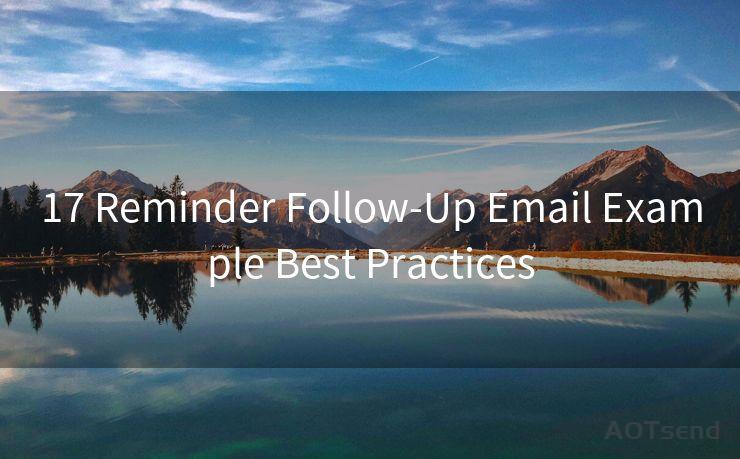17 Reminder Follow-Up Email Example Best Practices




In the fast-paced world of business communication, follow-up emails play a crucial role in maintaining relationships and ensuring tasks are completed. Here, we explore 17 best practices for crafting effective reminder follow-up emails, illustrated with examples for clarity.
1. Clear and Concise Subject Line
Start with a subject line that summarizes the purpose of your email. For example, "Follow-Up on the XYZ Project Status" immediately informs the recipient of the email's content.
2. Personalized Greeting
Always use the recipient's name in the greeting to create a personal connection. A simple "Hello, [Name]," sets a friendly and professional tone.
3. Recap of Previous Communication
Briefly recap the previous discussion or agreement to orient the reader. For instance, "As discussed in our last meeting, we agreed to..."
4. Specific and Actionable Request
Make your request clear and actionable. For example, "Could you please provide the updated figures for the project by Friday?"
5. Urgency Without Pressure
Convey urgency without being pushy. Phrases like "Your prompt response would be greatly appreciated" strike a balance between urgency and respect.

6. Appreciation for Time
Acknowledge the recipient's time is valuable. A sentence like "I appreciate your time and attention to this matter" goes a long way.
7. Provide Context or Updates
If there are any new developments or changes, include them in the email. For instance, "Since our last conversation, we have received new data that suggests..."
8. Use of Bullet Points
For longer emails or multiple requests, use bullet points to organize information and make it easier to read.
9. Professional Tone
Maintain a professional tone throughout the email, avoiding colloquial or informal language.
10. Call to Action
End with a clear call to action, such as "Looking forward to your response by [specific date]."
11. Contact Information
Provide your contact information or an alternative way to reach you for further clarification.
12. Proofreading
Always proofread your email for grammar and spelling errors before sending.
13. Avoid Excess CCs
Only include necessary recipients to avoid information overload.
14. Timing of Email
Consider the best time to send your email based on the recipient's time zone and work schedule.
15. Follow-Up Frequency
Be mindful of how frequently you send follow-ups to avoid being perceived as pushy or annoying.
🔔🔔🔔
【AOTsend Email API】:AOTsend is a Managed Email Service for sending transactional emails. Support Email Types: reminders, authentication, confirmations, notifications, verification codes, invoices, password resets, account activations, billing statements, two-factor authentication (2FA), and one-time passwords (OTP) emails, etc. $0.28 per 1000 Emails. 99% Delivery, 98% Inbox Rate.
You might be interested in:
Why did we start the AOTsend project, Brand Story?
What is a Managed Email API, How it Works?
Best 25+ Email Marketing Platforms (Authority,Keywords&Traffic Comparison)
Best 24+ Email Marketing Service (Price, Pros&Cons Comparison)
Email APIs vs SMTP: How they Works, Any Difference?
16. Tracking and Confirmation
Utilize email tracking tools to know when your email has been opened or read.
17. Closing Statement
End with a polite closing statement, such as "Thank you for your attention to this matter."
Incorporating these 17 best practices into your reminder follow-up emails will enhance their effectiveness and improve your professional communication skills. Remember, the key is to strike a balance between being persistent and respectful of others' time.




Scan the QR code to access on your mobile device.
Copyright notice: This article is published by AotSend. Reproduction requires attribution.
Article Link:https://www.mailwot.com/p6028.html



